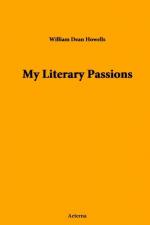In fact, although De Quincey was from time to time perfunctorily Tory, and always a good and faithful British subject, he was so eliminated from his time and place by his single love for books, that one could be in his company through the whole vast range of his writings, and come away without a touch of snobbishness; and that is saying a great deal for an English writer. He was a great little creature, and through his intense personality he achieved a sort of impersonality, so that you loved the man, who was forever talking-of himself, for his modesty and reticence. He left you feeling intimate with him but by no means familiar; with all his frailties, and with all those freedoms he permitted himself with the lives of his contemporaries, he is to me a figure of delicate dignity, and winning kindness. I think it a misfortune for the present generation that his books have fallen into a kind of neglect, and I believe that they will emerge from it again to the advantage of literature.
In spite of Heine and Tennyson, De Quincey had a large place in my affections, though this was perhaps because he was not a poet; for more than those two great poets there was then not much room. I read him the first winter I was at Columbus, and when I went down from the village the next winter, to take up my legislative correspondence again, I read him more than ever. But that was destined to be for me a very disheartening time. I had just passed through a rheumatic fever, which left my health more broken than before, and one morning shortly after I was settled in the capital, I woke to find the room going round me like a wheel. It was the beginning of a vertigo which lasted for six months, and which I began to fight with various devices and must yield to at last. I tried medicine and exercise, but it was useless, and my father came to take my letters off my hands while I gave myself some ineffectual respites. I made a little journey to my old home in southern Ohio, but there and everywhere, the sure and firm-set earth waved and billowed under my feet, and I came back to Columbus and tried to forget in my work the fact that I was no better. I did not give up trying to read, as usual, and part of my endeavor that winter was with Schiller, and Uhland, and even Goethe, whose ‘Wahlverwandschaften,’ hardly yielded up its mystery to me. To tell the truth, I do not think that I found my account in that novel. It must needs be a disappointment after Wilhelm Meister, which I had read in English; but I dare say my disappointment was largely my own fault; I had certainly no right to expect such constant proofs and instances of wisdom in Goethe as the unwisdom of his critics had led me to hope for. I remember little or nothing of the story, which I tried to find very memorable, as I held my, sick way through it. Longfellow’s “Miles Standish” came out that winter, and I suspect that I got vastly more real pleasure from that one poem of his than I found in all my German authors put together, the adored Heine always excepted; though certainly I felt the romantic beauty of ‘Uhland,’ and was aware of something of Schiller’s generous grandeur.




